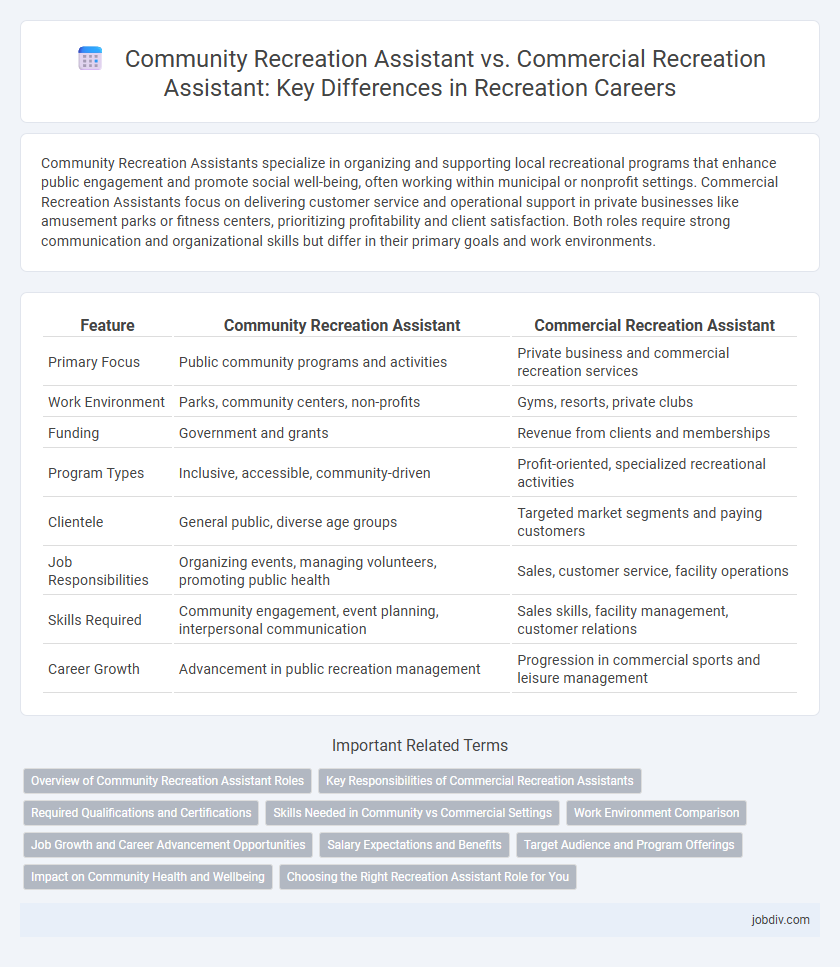Community Recreation Assistants specialize in organizing and supporting local recreational programs that enhance public engagement and promote social well-being, often working within municipal or nonprofit settings. Commercial Recreation Assistants focus on delivering customer service and operational support in private businesses like amusement parks or fitness centers, prioritizing profitability and client satisfaction. Both roles require strong communication and organizational skills but differ in their primary goals and work environments.
Table of Comparison
| Feature | Community Recreation Assistant | Commercial Recreation Assistant |
|---|---|---|
| Primary Focus | Public community programs and activities | Private business and commercial recreation services |
| Work Environment | Parks, community centers, non-profits | Gyms, resorts, private clubs |
| Funding | Government and grants | Revenue from clients and memberships |
| Program Types | Inclusive, accessible, community-driven | Profit-oriented, specialized recreational activities |
| Clientele | General public, diverse age groups | Targeted market segments and paying customers |
| Job Responsibilities | Organizing events, managing volunteers, promoting public health | Sales, customer service, facility operations |
| Skills Required | Community engagement, event planning, interpersonal communication | Sales skills, facility management, customer relations |
| Career Growth | Advancement in public recreation management | Progression in commercial sports and leisure management |
Overview of Community Recreation Assistant Roles
Community Recreation Assistants coordinate local programs promoting public engagement, focusing on inclusivity and diverse age groups within neighborhoods. Their responsibilities include organizing community events, assisting with class registrations, and supporting volunteer initiatives to enhance social cohesion. Emphasis lies on fostering accessible recreational opportunities that improve overall community well-being through collaboration with municipal departments and nonprofit organizations.
Key Responsibilities of Commercial Recreation Assistants
Commercial Recreation Assistants manage facility operations, coordinate recreational programs, and ensure safety compliance to enhance customer experience. They handle equipment rental, schedule activities, and support marketing efforts to attract clients. Their role demands strong communication skills and knowledge of commercial recreation laws and regulations.
Required Qualifications and Certifications
Community Recreation Assistants typically require a high school diploma or equivalent, with certifications such as CPR, First Aid, and sometimes a background in social services or community engagement. Commercial Recreation Assistants often need more specialized certifications, including lifeguard training, equipment operation licenses, or specific commercial recreation industry credentials. Both roles benefit from strong interpersonal skills, but commercial positions may demand higher qualifications due to liability and safety regulations in private enterprises.
Skills Needed in Community vs Commercial Settings
Community Recreation Assistants require strong interpersonal skills, cultural competency, and the ability to develop inclusive programs tailored to diverse local populations. Commercial Recreation Assistants prioritize customer service expertise, sales acumen, and proficiency in managing recreational activities within profit-driven environments. Both roles demand organizational skills, but community settings emphasize collaboration with public agencies, whereas commercial settings focus on business operations and client satisfaction.
Work Environment Comparison
Community Recreation Assistants typically work in public settings such as parks, community centers, and local government facilities, fostering inclusive programs that serve a broad demographic. Commercial Recreation Assistants operate in private enterprises like resorts, fitness clubs, and entertainment venues, often catering to paying clients and focusing on profitability and customer satisfaction. The work environment for community positions emphasizes public service and accessibility, while commercial roles prioritize market-driven objectives and a dynamic customer experience.
Job Growth and Career Advancement Opportunities
Community Recreation Assistants experience steady job growth driven by increasing public investment in local wellness programs and inclusive recreational activities. Commercial Recreation Assistants often see faster career advancement tied to dynamic private sector opportunities and specialized skill development in entertainment and tourism industries. Both roles benefit from growing demand in health-focused leisure services, but commercial positions may offer higher earnings potential and diverse career paths.
Salary Expectations and Benefits
Community Recreation Assistants typically earn between $30,000 and $45,000 annually, with benefits often including health insurance, retirement plans, and paid leave provided by municipal or nonprofit organizations. Commercial Recreation Assistants in private sector roles may see higher salary ranges from $35,000 to $50,000, reflecting the profit-driven nature of businesses, but benefits packages can vary widely and may be less comprehensive. Salary expectations depend on factors such as location, employer size, and specific job duties within community-focused or commercial recreational programs.
Target Audience and Program Offerings
Community Recreation Assistants primarily serve local residents, offering inclusive programs such as sports leagues, fitness classes, and cultural events designed to foster community engagement and well-being. Commercial Recreation Assistants cater to paying customers, focusing on specialized, often premium experiences like adventure tours, private lessons, and entertainment events tailored to individual interests. The core difference lies in the Community Recreation Assistant's commitment to accessibility and social benefits versus the Commercial Recreation Assistant's emphasis on profit-driven, customized recreational services.
Impact on Community Health and Wellbeing
Community Recreation Assistants play a vital role in enhancing public health by organizing inclusive programs that promote physical activity, social interaction, and mental wellness in local neighborhoods. Their efforts lead to improved community cohesion and accessibility to recreational resources, directly influencing overall wellbeing. In contrast, Commercial Recreation Assistants often focus on profit-driven services that may not prioritize equitable health benefits, limiting their impact on broader community health outcomes.
Choosing the Right Recreation Assistant Role for You
Community Recreation Assistants focus on public programs that promote inclusivity and local engagement, often working with diverse populations in parks, community centers, and schools. Commercial Recreation Assistants typically operate within private sectors such as resorts, fitness clubs, and entertainment venues, emphasizing customer satisfaction and revenue generation. Selecting the right role depends on your passion for community impact versus a preference for business-driven environments and specialized recreational services.
Community Recreation Assistant vs Commercial Recreation Assistant Infographic

 jobdiv.com
jobdiv.com